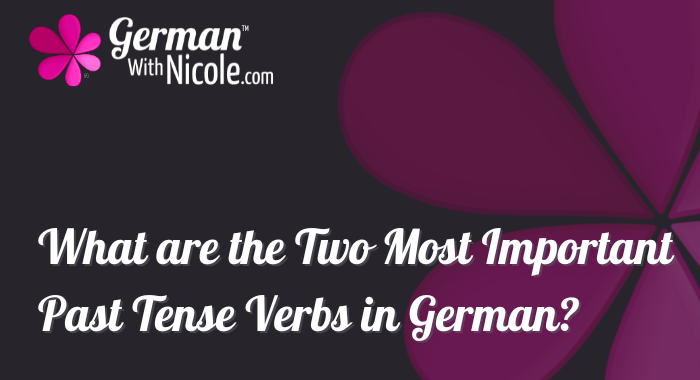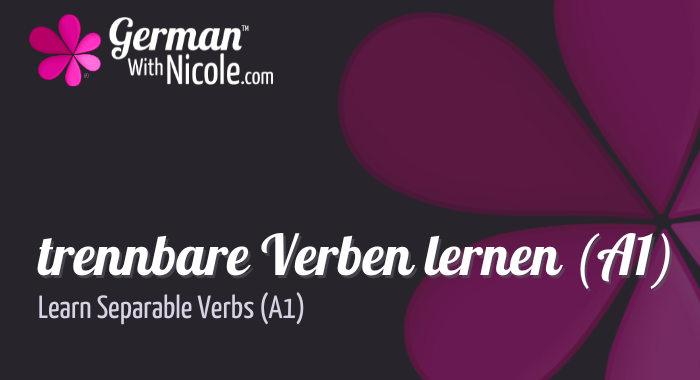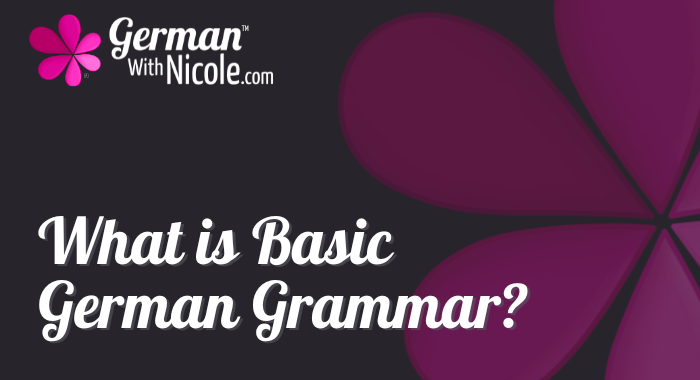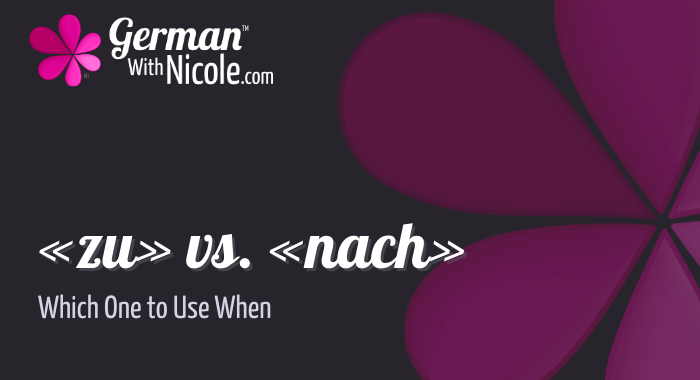das Blog
Grammatik
What are the Two Most Important Past Tense Verbs in German?
When you first learn German - or first start learning German - you say everything in the present tense. You learn only a little bit of the past tense, mainly the two verbs here, and then later you learn the Perfekt, or the spoken past tense (Ich bin gefahren. Wir haben ein Buch gelesen.).
This is the order you would ideally learn everything in:
Present tense --> these two verbs --> a bunch of the Perfekt
If you learn the past tense in any other order than that, it is out of order.
No excepti…
Separable Verbs in German: an Exercise
Here is a short exercise for you to practice two separable verbs in German: einatmen and ausatmen.
You may have noticed these two verbs in a blog post earlier this month, and to help you learn them even better, you'll use them in this exercise.
This may be the most relaxing German separable verbs exercise you'll find on the interwebs.
Here are the instructions in German. Scroll down to the flower to read the instructions in English.
Hier ist ein kurzes Audio für Sie.
Zuerst hören Sie «Ich…
Lernen Sie trennbare Verben ~ Learn German Separable Verbs
Today you get to learn separable verbs (trennbare Verben) just like one of my German clients!
This is a technique I've used with dozens of German learners and it makes separable verbs a kinaesthetic exercise--and that in two different ways.
You'll need print out or write out some cards, and to have one supply to have ready when you start the video.
Los geht's!
Step 1: Print out or make these cards of trennbare Verben
Download this PDF of 4x6 cards and print them.
If you can't print them, …
How to Use Separable Verbs in German
Separable verbs are not hard to understand, however learning to use them takes practice and time.
For the purposes of this first section, we'll use two separable verbs in the present tense – so we'll use them to talk about now.
Right now.
A separable verb (in German: ein trennbares Verb, plural: trennbare Verben) is a verb that requires you to do three things :
-
remove the prefix from the verb
-
conjugate what's left
-
tack the prefix on to the end of the sentence.
That's…
What is Basic German Grammar?
The A1 or beginner's level of German is frequently underestimated in its importance for learning German.
Starting at the beginning is not only the only place to start, but it's the most important place to start to understand German grammar.
If you're my client you'll hear this often:
You can't build a house on sand, so build a strong foundation.
One of the hardest times for my A2 clients (or B1 or B2 for that matter) is when we start a new topic involving some kind of grammar and they di…
"wohin" vs. "woher"
If you learned German in college, chances are you learned both “woher” and “wohin” at the same time.
Do you ever drive in reverse and forwards at the same time?
I didn't think so.
Why so many US textbook authors think this is a good idea is beyond me.
In drivers education, first you learn to drive forwards, you get a feel for the car, and then you learn to drive in reverse.
It's not that hard, textbook authors!
*Nicole facepalms and sighs with exasperation.*
That's a really good way…
"zu" vs. "nach"
"Zu..." no. "Nach..."
Wait! Which one do I use? GAH!
Have you said that before? I bet you have, as I’ve heard it from every beginning German learner I’ve worked with. And a lot of intermediate level speakers, too.
The difference is: with “zu” and “nach,” size makes a difference. But not how you might think.
When do I use “zu”?
“Zu” is used for places like
- die Bäckerei
- die Post
- your friend Michael’s house
- die Arbeit
- die Bushaltestelle
These are, in fact, all smaller places. A …
4 Reasons Minimalists Should Learn German (And Why German is Easier than English!)
If you are already living with less or a minimum amount of possessions, or would like to, this philosophy works in your favor when learning German. Experience a language which is significantly more predictable than English; German is a great language to explore!
You'll also discover here how, in many ways, German is actually easier than English. I say this as a native English speaker, a near-native German speaker, and an instructor for both languages.
Of course both languages have their own un…
Sorry, There is no Oxford Comma in German.
Discussions begin, lawyers are called, and lawsuits are filed. All of it is about a comma. (See what I did there?)
The Oxford comma is so important to people that spouses actually have discussions about it. They've talked about everything like where to live, how to manage their finances, and how many kids to have, but years later they find out only one of them uses the Oxford comma. [Cut dramatic music.] It's like now the real stuff of marriage has come to the forefront:
to use the Oxford comm…
21 Christmas Gifts for German Students - listed by learning level!
When you're buying a Christmas gift for someone who is studying German, you may not know exactly what they need. With one small piece of information, that is which level of German they are at, you can do some quality gift buying right here.
Be sneaky! Look on your German learner's book for one of these combinations: A1, A2, B1, B2, or C1. There might be a "+" after it or the book might show a range of levels, for example A2-B1. Sometimes the letter/number combination is on a blue square with th…
Categories
- A1 (69)
- A2 (54)
- B1 (46)
- B2 (23)
- C1 (22)
- Deutsch lernen (80)
- Einkaufen (15)
- Essen (12)
- Grammatik (23)
- Hören (14)
- Landeskunde und Kultur (50)
- Lesen (11)
- Musik (5)
- Nachrichten (4)
- Podcast (64)
- Pronunciation (3)
- Schreiben (3)
- Schwäbisch (4)
- Spiele und Spaß (Games and Fun) (12)
- Sprechen (13)
- Vokabeln (39)
- Video (11)
Would you like to hear about future German classes with Frau Warner?
With the E-Post, you'll receive information on German class registration and goings-on in German classes, all written by Frau Warner. You'll receive an email on Tuesdays, plus an extra email or two when class registration opens or there's something new.









